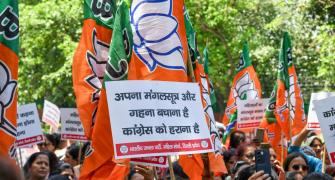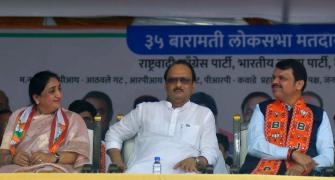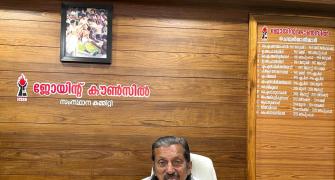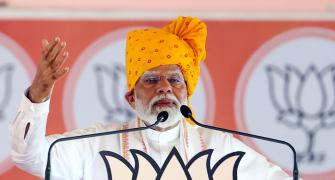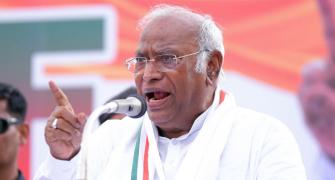Anand Mohan Sahay spoke to sociologist Imtiaz Ahmad about the controversy.
Professor Ahmad taught at Delhi's Jawaharlal Nehru University and has written several books on Indian Muslims.
Why are Muslims opposed to singing Vande Mataram? Is it really against Islam or is there some other reason?
Muslim is an inclusive term and one has no means of knowing whether all Muslims are opposed to singing Vande Mataram. I am sure that many Muslims may choose to sing it. Therefore, it is necessary to distinguish between Muslims who oppose the song on the ground of religious ideology and those -- while they are equally Muslims -- who do not bring religion into this.
I remember that as a child I was singing it in school and in prabhat pheris. This practice still continues across the country. Muslims alone are not opposed to making the singing of Vande Mataram compulsory. So many people with a secular bent of mind are also opposed to the idea and for sound reasons.
Muslims may find this song distasteful because of its Hindu flavour, but even secular-minded Hindus find its religious undertones unsavoury and unpalatable.
The inheritance of the song is both sectarian and religious and the context in which it originated was shaped by a notion of narrow nationalism, which sought to equate the nation with Hindus, and used Hindu imagery to appeal to the Hindus to rise up against the Muslim colonialists.
It has sometimes been argued that the Muslim in Bankim's Ananth Math was a surrogate for the British, but this does not make a difference. The song is an invocation to Hindu goddesses as well as to the country deified as the Mother. I strongly feel the opposition here is really between a religious or sectarian vision and a secular-democratic worldview.
This is how the issue should be looked at, rather than as a Hindu-Muslim issue.
Will this opposition to Vande Mataram not harm Muslim interests and further strengthen their image of being fundamentalist, not ready to adapt with changing times?
If Muslims fight this battle on religious terrain alone, the fear implicit in the question would turn out to be real.
If the issue is fought on the secular and democratic terrain, that fear is unfounded.
Muslims are equal citizens of the country and if a sectarian and narrow Hindu nationalist opinion seeks to inflict the singing of a sectarian song to an extent that democratic freedom is compromised, then not opposing it would do greater harm.
Some say Muslim politicians are opposing the singing of Vande Mataram with a vested interest. How do you see this?
Politics is about interests. Both Muslim leaders, who have raked up the bogey of Islam being opposed to singing of Vande Mataram, and the Bharatiya Janata Party and its like-minded parties like the Shiv Sena, who are insisting that the singing of Vande Mataram signifies patriotism, are equally motivated by interests.
The BJP interest is to consolidate a Hindu constituency and to paint Muslims as renegades and unpatriotic. The Muslim leadership's interest is to consolidate a Muslim constituency and to gain political mileage.
Fortunately, the people of this country understand this and are lukewarm to these overtures from both sides. Were it not for the media, no one would even see this as a worthwhile issue. This holds equally for both the Hindu and Muslim masses.
It is often said that Muslim liberals and intellectuals are reluctant to oppose Muslim leaders on issues like Vande Mataram. Do you agree with this understanding?
I will answer this question with another question. Why should anyone expect Muslim liberals and intellectuals to start jumping like rabbits every time an issue of this nature is raked up? Whenever issues of a serious nature have arisen, Muslim intellectuals -- like other intellectuals in the country -- have intervened. Why should anyone expect that Muslim intellectuals should always be ready to get entangled in such brawls when it is known that the entire issue is politically motivated?
As an expert on Indian Muslims, what stand do you think the common Muslim must take?
There is a fundamental problem in this country. People do not question their own communalist tendencies and only charge others of communalism. They must remember that unless one fights the communalism within their own community, they cannot fight the communalism of other groups.
For one, Muslims should cold shoulder the overtures of their communal leadership and ignore them. Second, if they are opposed to the singing of Vande Mataram -- the Constitution gives them the right to do so -- they should show their opposition in strictly secular and democratic terms and not in Hindu-Muslim terms.
If people adhere to this dictum, the right-wing forces on both sides will be isolated and will find themselves beating their wings in the void without any tangible advantage to them.
Citizenship imposes the obligation on the people to respect their national symbols and that respect can be shown in a wide variety of ways. No one has the license to say that respect can be shown in a particular way -- such as, in this case, by necessarily singing the song. This idea goes against the grain of democracy and can only be valid in an authoritarian or theocratic dispensation.

